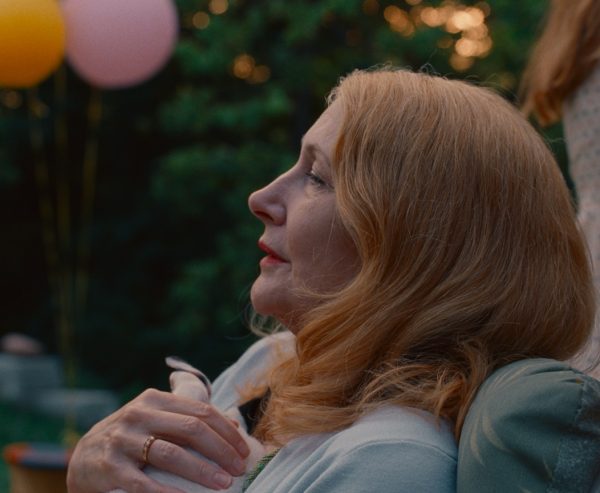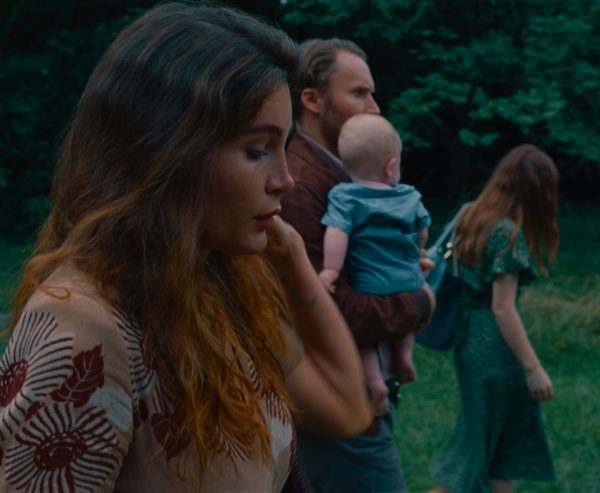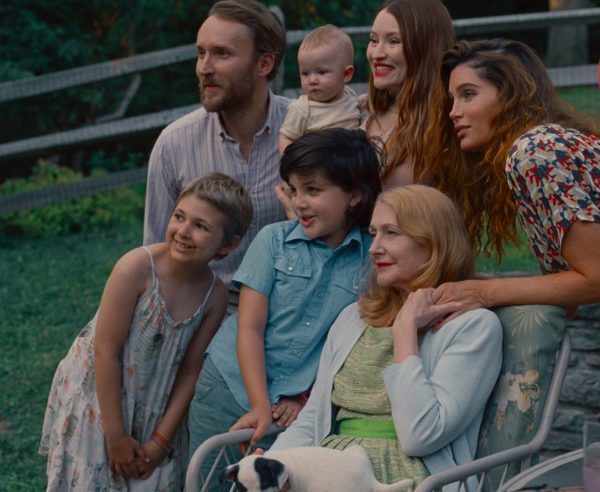‘Monica’ examines acceptance, forgiveness, choice

“Monica” (2022 production, 2023 release). Cast: Trace Lysette, Patricia Clarkson, Emily Browning, Joshua Close, Adriana Barraza, Graham Caldwell, Ruby Fraser, Brennan Pittman, Leland Pittman, Chelo Acosta-Conley, Bobby Easley. Director: Andrea Pallaoro. Screenplay: Andrea Pallaoro and Orlando Tirado. Web site. Trailer.
When an adolescent expresses his belief that he would like to undergo the transition as a transgender female, his family is appalled, kicking him out of the house. His mother, Eugenia (Patricia Clarkson), is especially outraged, dropping him off at the bus station and leaving him with the parting words, “I am no longer your mother.” And so, with those cold, terse sentiments, he leaves behind his life in Ohio to start anew in California.
Scroll ahead to a time many years later. Having proceeded with her transitionary plans, Monica (Trace Lysette) now lives her new life. The process has been far from easy, and it’s not particularly perfect, even now. She has her share of issues to work out, especially where relationships are concerned. But, despite these challenges, she carries on, continuing to find herself and to live life on her terms, something in which she appears to take considerable satisfaction.
Events soon take an unexpected turn, however. Monica receives a phone call from her sister-in-law, Laura (Emily Browning), someone she’s never met in person. Having not been back to the Midwest since her unceremonious departure, she’s been out of touch with her family and the events that have transpired during that time, conditions that have left her unaware that she even has a sister-in-law. In any event, when Monica asks Laura about the reason for the call, she learns that her mother is terminally ill, suffering the devastating effects of a malignant brain tumor. Laura recommends that Monica return home, partly because her help as a caregiver would be greatly appreciated and partly because it may be her last chance to achieve any sense of closure, the pain of the past notwithstanding.

At first, Monica is unsure what to do. But, after giving the matter some thought, she decides to make the trip back east, not certain what the visit will be like, what impact it might have on her, how she’ll be able to handle herself under the circumstances and whether it will provide her with answers to so many unresolved questions.
So what does Monica find? For starters, she meets family members previously unknown to her – Laura and her three children, Brody (Graham Caldwell), Britney (Ruby Fraser) and Benny (Brennan Pittman, Leland Pittman). Monica is initially unsure what to make of these relatives she’s never met, but she’s welcomed warmly and sensitively, treatment that she finds comforting under the circumstances.
Laura then outlines what Monica can expect when she meets Eugenia, the first time she’ll be in her mother’s company since undergoing her transition. Laura explains that, given the advanced state of Eugenia’s condition, she often experiences trouble with mobility, as well as memory-related issues. And, because Eugenia has never met her child as Monica, it’s unclear whether she’ll even recognize her own offspring. That wrinkle makes the situation even more unsettling for Monica; how should she introduce herself to her own mother?
Laura lends a helping hand with this. When she and Monica arrive at Eugenia’s house – Monica’s childhood home – they’re greeted by Leticia (Adriana Barraza), the patient’s doting caregiver. She leads them to Eugenia’s bedroom, where Laura introduces Monica as an additional caregiver, someone who’s going to provide her and Leticia with much-needed assistance. Laura later explains that she did this without further elaboration so as not to intrude on whatever plans Monica may have in mind to let Eugenia know who she is, a conversation whose nature Monica herself has yet to work out.
It soon becomes apparent to Monica that her visit will likely end up lasting longer than she may have originally anticipated. So, until she decides how to handle “the talk” with her mother, she chooses to maintain her ambiguous identity. In addition to buying her time to figure what she wants to say to Eugenia, it allows Monica an opportunity to get reacquainted with this person who has become a virtual stranger to her after all these years and in the wake of the onset of her illness. It proves to be a wise move, too, given that Eugenia doesn’t exactly warm up to the appearance of “strangers” in her life under these trying conditions unless they prove themselves worthy of her acceptance, which, thankfully for her sake, Monica manages to win over.

As Monica works toward winning over Eugenia’s approval, she needs to do the same with her brother, Paul (Joshua Close). Through their conversations together, it’s apparent the siblings were quite close when they were younger, but they’re not entirely sure where they stand now. Paul was devastated when his then-brother suddenly vanished, and, when he meets his sibling for the first time since her transition, he openly admits that he wouldn’t have recognized her as his relative if he were meeting her independent of this situation. Paul seems to want a return to the closeness he once shared with Monica, but how does he go about achieving that? Monica is likewise unclear on this point, despite a desire to attain it, especially since her brother may soon be the only immediate family member she has left. The ups and downs of this part of the process further complicate this family reunion, with no clear-cut answers in sight.
Meanwhile, as all of these various relationships evolve, Eugenia’s condition continues to deteriorate. Will matters be successfully resolved before it’s too late? What form will they take? And what will that mean for the future? While it’s true that there’s a lot to be made up for, there’s also an opportunity for much good to be carved out as everyone heads down the road together. Here’s hoping that things turn out better than when Monica was still a teenager.
Such are what emerges as a result of the conscious creation process, the philosophy that maintains we draw upon our thoughts, beliefs and intents in manifesting the reality we experience. It’s unclear whether Monica has ever heard of this way of thinking, but she should nevertheless be prepared for it and what it can produce based on the beliefs she adheres to – and puts out there.

This scenario is potentially perplexing, given that Monica has a range of options available to her. So the key question she must address is, “Which one should I choose?” She could stay mired in bitterness. She could embrace forgiveness. But will opting for forgiveness provide a sense of satisfaction considering what happened in the past? At the same time, will passing up an opportunity to bestow it leave her feeling fulfilled given that time may be running out for being able to avail herself of that option? And, in light of the fact that Eugenia doesn’t even know who Monica is, will either choice even matter in the end?
Given the circumstances, the key consideration Monica must bear in mind is that, no matter what she does, the decision is hers, because the power of choice involved in it is hers. It’s a birthright that resides in her consciousness and is always available to her to do with what she wants – and, in this case, what she believes is best. But, again, what will she choose?
Perhaps looking within would provide some valuable clues in making her decision. Maybe she needs to ask herself, “What do I want most out of this situation?” In particular, she might want to consider examining what she wanted to come out of this scenario when she first approached her mother in announcing her intent – acceptance of her desires, her wishes and her nature.
When an adolescent young man tells his mother that he yearns to make the transition to become the woman inside him and that heartfelt revelation is rejected, he experiences a blatant dismissal, one that truly hurts given that it comes from his own parent, someone who supposedly loves him. The lack of acceptance is hurtful in a way that cuts very deeply and leaves a lasting, undeniable impression. But now that this individual has become the woman she so dearly longed to be, is it right for her to respond the same way her mother once did, to willfully deny her acceptance of who she is? Isn’t that somewhat hypocritical? Can she live with herself by buying into such beliefs, especially since she may soon no longer have the chance to change things?
Fortunately, Monica has tools at her disposal that may prove helpful in making her decision. In addition to her innate power of choice, she also has access to circumstances that she can draw upon to test the waters with Eugenia. For example, she can explore various possibilities for how to handle her relationship with her mother through her reassessment of her relationship with Paul, which has also undergone more than its share of strain over the years, including in the current time frame. She can ask herself, “What do I want from the situation with my brother for the future?” What’s more, can she draw from those discussions and transfer those insights into her assessment of her circumstances with her mother? And, if so, what?

Monica is not the only one who has an opportunity for such an exercise. Paul has the option to do the same, both in his relationship with his sister and in his marriage to Laura. As becomes apparent, he’s been experiencing issues with his wife for some time, and he’s having trouble identifying the cause. But perhaps he need only look to himself; indeed, isn’t it possible that he may have internalized some of the toxic beliefs from what appears to have been a volatile upbringing and he’s now projecting them into his feelings for Laura (and possibly Monica)? Perhaps it’s true when they say that some of our beliefs stem from learned behaviors in our youth that we consequently (and unconsciously) repeat by projecting them outward into the existence around us? If Paul manages to recognize and understand this, he may have an opportunity to rewrite his beliefs and repair his relationships with his wife and sister. Maybe some of that might even rub off on Monica, too.
Perhaps the most important point to recognize in all this is that these circumstances are not intractable. Change is truly possible, provided we recognize what’s at the heart of what needs to be fixed. By employing our powers of choice and our ability to alter what’s not working, we have an opportunity to strike out in new directions and to shift the future in ways that aren’t determined by a damaged past. The question is, “Do we have the courage and fortitude to make that happen?” For Monica’s sake, let’s hope she does.
Acceptance, reconciliation and forgiveness are arguably among the hardest feelings for many of us to deal with, but coming to terms with them is by no means impossible. That’s the choice being given to an estranged mother and daughter in this thoughtful new meditation from writer-director Andrea Pallaoro. The filmmaker’s third feature outing presents a deftly nuanced, sensitively handled story of a family painfully torn apart trying to put itself back together again under trying circumstances and while there’s still time. The pacing comes across as somewhat slow (undoubtedly by design), so those expecting material that moves along at a brisk, breezy clip may not find it to their liking, but, given the profound nature of the subject matter, it suits the narrative perfectly. There are admittedly a few plotline gaps here and there, but they’re more than adequately compensated for by the film’s superb ensemble cast, razor-sharp writing, and gorgeous, atmospheric cinematography. “Monica” may not have received much fanfare upon its theatrical release earlier this year, but this fine streaming offering is well worth the time, providing viewers with a moving cinematic experience that many of us can probably relate to – and whose wisdom should be thoughtfully considered should the need for drawing upon it arise in one’s life.
Copyright © 2023, by Brent Marchant. All rights reserved.



